
Suddenly Last Summer (1959) Part I -The Devouring Mother, the Oedipal Son & the Hysterical Woman


Mrs. Venable: “Doctor! “
Catherine Holly: “It’s the truth! “
Mrs. Venable: “See how she destroys us with her tongue for a hatchet? You’ve got to cut this hideous story out of her brain. “
Catherine Holly: “How much are you willing to pay for that, Aunt Vi?”


“How she killed him, how she murdered him at… ask her!!”

Here, the story is told using the mechanism of flashback. Each frame is revealed on Catherine’s face. The overlay of images set upon her visage engulfs Catherine in the visual narrative; therefore, her reaction is always present in the final scene of Sebastian’s last hours on Earth. This firmly roots her psyche more deeply into the mania, the madness, and the hideousness of the event as it unfolds. It also serves to release us as spectators from any doubt that Catherine might be as delusional, as sick as Mrs.Venable would like everyone to believe. She has been given sodium pentothal, a truth serum; therefore, her accounting cannot lie. We witness the moment of truth.
Catherine begins to describe how Sebastian forced her to wear a “scandalous” white and see-through bathing suit on the beach in order to attract attention, the gaze of the surrounding males. The ploy has worked, and soon Catherine, as bait, has summoned all the young men, including adolescent boys who have come to ogle her.
Catherine also refers to having had to wait for Sebastian to surface from the bathhouses at the end of each afternoon. Afterward, he would scatter handfuls of money, or “tips,” to the gang of youths, the mob of them increasing in number with each new day.
“He bought me a bathing suit I didn’t want to wear. I laughed I said I can’t wear that, well it’s a scandal to the jaybirds.”
“What do you mean was the suit immodest?”
“It was a one-piece bathing suit, made of white something, the water made it transparent, I told him I didn’t want to swim in it”¦but he just grabbed my hand and dragged me into the water. All the way in, and I came out looking naked.”
Dr. Cukrowicz pushes Cathy, “Why did he do that? You know why he did that?”
“YES, To attract attention…” She insists, surprised at his naivete.
“Why because he thought you were lonely?… Did he think he could shock you out of your depression?”
“You know why I was doing it, I told you, I was procuring for him. Sebastian was lonely Dr, that empty bluejay notebook got bigger and bigger, so big it was big and empty like that big empty blue sea and sky. And before long when the weather was warmer and the beach so crowded he didn’t need me anymore for that purpose the ones from the free beach would climb over the fence or swim around it. So now he let me wear a decent dark suit, I go to a far end of the beach, and write postcards and letters and keep up my third person journal til it was time to meet him outside the bathhouses on the street.”

As Catherine relates the final day, the fateful one when Sebastian is ripped apart, she describes them sitting at an outdoor cafe, when suddenly a crowd of boys who paralleled the motif, “a flock of plucked birds,” who beg for bread. They assemble behind a fence like animals stalking their designated prey. Sebastian, weak, sickly, and soaked in his white linen suit, flees the cafe in abject terror. But the mob of boys pursues him through the streets of the town until he is finally overcome and eclipsed by the ravenous fury of the hungry boys. The camera uses a leached white photographic lens; Catherine speaks of it being so burning bright white. In contrast to a scene that could have been done completely in Gothic horror’s ominous shadowplay, the use of light is terrifying as it is sobering, because the horror of the event happens in the stark light of day, out in the openness of it all.
“Suddenly, last summer, he wasn’t young anymore. We went to La Cabesa de Lobo and suddenly he switched from evenings to the beach, I mean from the evenings to the afternoons. Suddenly, Cousin Sebastian changed to the afternoons and the beach.”
Dr. Cukrowicz asks, “What kind of beach was it? Was it a public beach?”
“Yes, public.”


“Go on”, she tells her, but Cathy says, “I don’t want to go on.”
“Every day, you and your cousin Sebastian would go to this free public beach.”
“It was the free one, the free one was right next to it.”
The scene cross-fades back in time to that fateful day last summer.
Catherine tells Dr. Cukrowicz that there was a fence between the beach they were at and the one that didn’t charge to get in. He asks if anything happened there that disturbed her, and she answers, “Yes.”
“He would come out, followed.”
“Who’d follow?”
“The hungry young people that had climbed over the fence of the free beach. He’d pass out tips among them as if they had all shined his shoes or called a taxi for him each day the crowd got bigger, noisier… greedier, and at last, we stopped going out there.”
“Then after that, after you stopped going to the public beach?”
“Then one day, a few days after we stopped going out to the beach, it was a blazing white day, not a blazing hot blue day, a blazing hot white one”¦ we had a late lunch at a shabby restaurant by the sea there, Sebastian was as white as the weather, he had on a white silk suit, a white tie, a white Panama and he kept touching his face here and there, with his white silk handkerchief and popping little white pills into his mouth all the time and I knew he was having a bad time with his heart and that it frightened him and he said, ‘let’s go north’ he kept on saying I think we’re don’t with Cabeza de Lobo I think we’ve done it, don’t you?”
“Then, there were those children along the beach which was fenced off with wire. Our table was less than a yard away from the wire fence. And those children, there was a band of them, they looked like a flock of plucked birds and they came darting up to the wire fence as if they’d been blown there by the wind by the hot white wind from the sea. And they were all calling out… Pan Pan Pan.”
“They were calling out for bread?”
“They made gobbling noises with their mouths, stuffing their fists into their mouths. Making gobbling noises with frightful grins. We were sorry we’d come to the place, but it was too late to go.”
“Why was it too late to go?”
“I told you Cousin Sebastian wasn’t well, his eyes looked dazed, but he said, ‘Don’t look at those little monsters’ beggars, they’re a social disease in this country, if you look at them you get sick of the country it spoils the whole country for you.”
The sound of the angry, primal horns saturates the landscape of the flashback with a feverish sort of battle cry. Dr. Cukrowicz tells her to go on.
“I am going on, (the augmenting horns herald the coming of the end)The band of children began to serenade us, play for us on instruments, make music if you could call it music, their instruments were instruments of percussion, do you know what I mean?”
“Yes, actually I do, like drums, drummers.”
“As far as I could make out in the white blaze of the sand beach, the instruments were tin cans all strung together and bits of metal that had been flattened out and made into cymbals you know.”
“Yes, brass plates hit together.”
“Tin cans flattened out, yes, cymbals… the others had all sort of things that were picked up off the beach that made a sort of noise, uh music, a music made out of noise.”
“Go on.”
“I am going on, nothing could stop me now.”
“Cousin Sebastian, was he entertained by this concert?”
“Terrified, about it.”
“terrified, why?”
“I think he recognized some of the musicians. Some of the boys, between childhood and older.”
“What did he do? Did he complain to the manager about it.?”
“What manager… God? You don’t understand my cousin.”
“What do you mean?”
“He accepted all as how things are, thought nobody had any right to complain or interfere in any way whatsoever. Even though he knew what was awful was awful and what was wrong was wrong, he thought it unfitting to take any action whatsoever except to go on doing as if something in him directed.”
“What did this something in him want him to do?”
“He suddenly pushed himself away from the table and said they’ve got to stop that, make them stop that. I’m not a well man, I have a heart condition. it’s making me sick. That was the first time, my cousin Sebastian ever attempted to correct a human situation. I think that was his fatal error. He stalked out of the restaurant after throwing a handful of paper money on the table. Fled from the place. I followed. It was all white outside…White hot, a blazing white hot.”
“You followed Sebastian onto that hot white street, running along the beach. He ran along the beach?”
“No No, we didn’t, we didn’t move either way, I rarely made any suggestion but this time I did.”
“What did you suggest?”
“Cousin Sebastian seemed to be paralyzed at the entrance of the cafe, so I said let’s go. I remember I said around that way is the harbor and were more likely to find a taxi near there. Or why don’t we go back in and have them call us a taxi? Oh let’s do, let’s do that’s better”¦”
“And he said are you mad, go back in that filthy place never, ‘That gang of kids shouted vile things about me to the waiters.’
“Oh, I said well let’s go down towards the harbor, let’s not try to climb that hill in this dreadful heat.”
Cousin Sebastian shouted ‘please shut up, let me handle the situation, will you. I want to handle this thing. And he started up the steep street with his hand stuck in his jacket where I knew he was having a pain from his palpitations. But he walked faster and faster, in panic. The faster he walked, the louder and the closer it got.”
“What got?”
“The music. The music again.”
“The noise of the following band, they were following, they were following up the blazing white street, up straight up it was the only way open, so he went that way.”
“He tried to escape from those… He tried to escape… no street, but he couldn’t find a way out. He couldn’t find a way out!”
“What’d the band of children do then?”
“He tried to escape from the street”¦ down those little side streets between the buildings.” (we see Sebastian throwing down confetti of paper money on the dirt street. Surrounded by the assailing flock of street urchins on a ritualistic hunt.)
“They came from everywhere. So the only way was up”¦the only way was straight up”¦up those steep white streets. And the sun that was like a great white bone of a beast that had caught on fire in the sky.”
“And Sebastian kept running straight up, I don’t know how he ran, he never ran, but he ran”¦ he ran and ran where it was whiter and emptier.”
“What was emptier?”
“The light, the sky, and the light those steep white streets and the sun, everything blazed white and empty.”
“Where did the streets lead to?”
“Nowhere, he never reached the end. They stopped nowhere, never, he, except…”



“Except?”
“At the very top of the hill, a place, a ruin, broken stones like an entrance to a ruin temple, some ancient ruin temple (the horns blast again, the horns of war, victory, the signaling of primal rage)
they overtook him, there in that…”“And you Catherine, what did you do then?”
“I heard Sebastian scream, he screamed just once, I then I then I, HELP!!!!!!!!”
“I ran, they let me run, they didn’t even see me.”
“Run where?”
“Down, I waited, police ran up to, back up to where, to where cousin Sebastian was, he was lying naked on the broken stone and this you won’t believe”¦nobody, nobody could believe it, it looked as if they had devoured him.”(she collapses) as if they tore or cut parts of it away with their hands or with knives or with jagged tin cans they made music with. As if they had torn bits of him away. and stuffed them in their gobbling mouths. There wasn’t a sound anymore. There was nothing but Sebastian, Sebastian, Sebastian, lying on those stones torn and crushed.”
Catherine collapses, wiped out, sobbing, released from her core fears, spent from the memories of the ordeal. She has allowed the flood of horrific images to bear witness and allow it to pour out of her, no longer a hostage, finally.
The scene cuts away to Aunt Violet closing the Summer Poetry journal.
Dr. Cukrowicz goes over to Mrs. Venable. She looks resolved, eerily still and glassy-eyed, as she grabs his hand and holds it to her cheek “Ah there you are I thought you were still on deck, and where’s your hat, oh, dear you’ll get fever.”
She touches her hand to his forehead to feel for temperature. Catherine is still crying in the background.
It is Catherine who has been released from this relentless nightmare, as Mrs. Venable has submerged herself deeper into the depths of her macabre fixation with her son. Ultimately, she exposes herself as the story’s true ‘hysterical woman’ whose rhythmic flutter of delusion is now reinforced by the stark truth about her son’s true nature and the way he died.
“A whole day of you digging in the hot sun, watching those awful hungry birds. I don’t know what you see in such terrible sights. It’s too much for both of us my darling that horrible sun…”
“Of course God is cruel, we didn’t need to come to the end of the Contadas to look at the turtles to find that out, did we? You know we’ve always known about him, the savage face he shows to people. And the fierce things he shouts, it’s all we ever really see or hear of him now”¦ nobody seems to know why. The difference is we know about him, the others don’t. Go rest my darling.”
“Oh, Sebastian what a lovely summer it’s been just the two of us. Sebastian and Violet, Violet and Sebastian. Just the way it’s always going to be. Oh, we are lucky my darling, we have one, and other need no one else ever.”



Mrs. Holly wants Catherine to come home with them. Dr.Cukrowicz tells them she’s going to be alright.
Dr Cukrowicz walks toward Catherine, whose back is turned to him, standing in the wild garden, a garden filled with the cycle of both death and renewed life, a new beginning.
“Catherine, Miss Catherine” he calls to her with an air of soft and dignified cadence.
“She’s here doctor. Miss Catherine’s here.” Smiling, third person, happy, released.
The camera pulls away, showing them walking to each other. Catherine grabs his hand.
THE END
Below: A LITTLE EXTRA READING IF YOU WISH!
THE HYSTERICAL WOMAN, THE WOMAN’S BODY, AND FEMALE SEXUALITY-FOUCAULT AND FEMINISM.
So I’ll ask the question, is Catherine’s sexuality, as well as the invisible Sebastian, in danger of being associated with madness because she and he are a woman and a man who have experienced sensual awakening? It evokes for me Michel Foucault’s (himself a homosexual) argument, while he doesn’t literally vocalize his theoretical writings from a pro-feminist standpoint, as a philosopher, it revives the conversation about ‘women’s sexuality, her body and its power.
From the Internet Encyclopedia of Philosophy (IEP), A Peer-Reviewed Academic Resource.
Foucault and Feminism
Poststructuralism and contemporary feminism have emerged as two of the most influential political and cultural movements of the late twentieth century. The recent alliance between them has been marked by an especially lively engagement with the work of French philosopher Michel Foucault. Although Foucault makes few references to women or to the issue of gender in his writings, his treatment of the relations between power, the body and sexuality has stimulated extensive feminist interest. Foucault’s idea that the body and sexuality are cultural constructs rather than natural phenomena has made a significant contribution to the feminist critique of essentialism. While feminists have found Foucault’s analysis of the relations between power and the body illuminating, they have also drawn attention to its limitations. From the perspective of a feminist politics that aims to promote women’s autonomy, the tendency of a Foucauldian account of power to reduce social agents to docile bodies seems problematic. Although many feminist theorists remain critical of Foucault’s questioning of the categories of the subject and agency on the grounds that such questioning undermines the emancipatory aims of feminism, others have argued that in his late work he develops a more robust account of subjectivity and resistance which, while not without its problems from a feminist perspective, nevertheless has a lot to offer a feminist politics. The affinities and tensions between Foucault’s thought and contemporary feminism are discussed below.
THE CASSANDRA COMPLEX
The Cassandra metaphor (variously labeled the Cassandra ‘syndrome’, ‘complex’, ‘phenomenon’, ‘predicament’, ‘dilemma’, or ‘curse’) occurs when valid warnings or concerns are dismissed or disbelieved.
The term originates from Greek Mythology. Cassandra was the daughter of Priam, the King of Troy. So struck by her beauty, Apollo gave her the gift of prophecy, but when Cassandra refused Apollo’s romantic advances, he placed a curse ensuring that nobody would believe her predictions or warnings. Cassandra was left with the knowledge of future events but could neither alter these events nor convince others of the validity of her visions.
Much like Catherine, who tries to tell of the horrific events that led up to Sebastian’s death, no one will believe her story. Within the narrative, both desire and language have become ‘uncontrollable.’ Starting with Sebastian’s sexual transgressions at Cabeza de Lobo and ending with Catharine’s ensuing “babbling” – which neither Mrs. Venable nor the doctors or nuns at St Mary’s are able to “shut up.”

The Cassandra metaphor forms another one of the key tropes of the story about what lies hidden, denied, and what is taboo, or as Violet refers to “unspeakable things.” Dr. Cukrowicz’s insistence that Catharine leaves “nothing not spoken” challenges Violet’s aggressive pursuit to silence her niece using Doctor Cukrowicz as a weapon, performing the lobotomy which will “cut this hideous story out of her brain!”
“Many cases that had previously been labeled hysteria were reclassified by Sigmund Freud, as anxiety neuroses”– Micale, Mark S. (July 2000). “The Decline of Hysteria”. Harvard Mental Health Letter 17 (1): 4″“6.
THE HYSTERICAL WOMAN – historically has been described as being prone to the appearance of an agitation of the hands. Crying, whimpering, or whispering. Much like Eleanor Lance in Shirley Jackson’s story The Haunting of Hill House, her revolving inner monologues that emerge in Robert Wise’s screen adaptation as maniacal externalized rantings. The indication of longing for something unattainable, release, or any type of escape from torment. This can be considered the body language that can be observed as ‘the hysterical woman.”
Repeatedly, the fluctuation of a woman’s emotional disposition has always been acutely pathologized. Like that of the Cassandra myth, Catherine Holly is a woman whose distress or anxieties are dismissed as signs of weakness, a fragile psyche, a perceived excessive sexual drive, or a pathologically self-destructive mind, where a woman could descend into a deeper, dangerous psychosis. The cure naturally cut it out of her.
The hysterical diagnosis springs from classical times and evolved or was transformed into a pervasive archetype, with dangerous consequences to women’s protection for not only her safety but also her wholeness. It goes to the threat of her identity being erased.
The accounting of “˜the hysterical woman’ was prevalent in the Victorian Age, as the “disorder” and its “treatment” culminated in odd methods of relief from the incitement of “hysterical paroxysm.” Doctors used invasive objectification of the woman’s body by appropriating pelvic massage, (an illustration of this technique If you haven’t seen it, watch The Road To Wellville 1994, it’s just a hoot in general) all the way to condemning them to indefinite institutionalization and ultimately to the extremes of neurosurgery (lobotomy), and electric shock therapy. Of course, this can be seen as yet another instrument of socio-cultural domination and control over women’s bodies and their expressed power.
Catherine Holly, as The Hysterical Woman, loses her identity; she is no longer possessive of a ‘self’. Epitomized by her referring to herself in the third person. The “hysterical woman” is essential; it’s fundamental to the nature of the story. She is reduced to signals, gestures, and deeds. Dismissed and annihilated of any nuance or subjectivity. It is notable at the end of the film that she tells Dr. Cukrowicz ‘She’s here, doctor, Miss Catherine is here.” After the brutal but necessary purging of the truth, by way of the serum and regression therapy that he uses to draw out the traumatic memories from her subconscious. She can re-emerge as the whole self once again.
An interesting read is by Carroll Smith-Rosenberg in her journal article THE HYSTERICAL WOMAN: SEX ROLES AND ROLE CONFLICT IN 19th CENTURY AMERICA* Smith-Rosenberg states, “What was diagnosed as hysteria in the nineteenth century is not necessarily related to the hysterical character as defined in the twentieth century, or again to what Greeks meant by hysteria when they christened the disease a millennia ago. The one constant in this varied history has been the existence in virtually every era of Western culture of some clinical entity called hysteria; an entity which has always been seen as peculiarly relevant to the female experience, and one which has almost always carried with it a pejorative implication.”

DESIRE vs. CANNIBALISM, GAY MALE SEX, THE SACRIFICE OF SEBASTIAN AS MARTYR, AND THE UNREPRESENTATION OF FRAGMENTATION OF THE BODY.

DESIRE AND THE BLACK MASSAGEUR
“We all devour each other, in our fashion” –Tennessee Williams
It is very telling that Williams named Sebastian after the famous Martyr, Saint Sebastian, the prominent portrait of which hangs in the poet’s Atelier, and while Catherine gives one of her monologues, alludes to the facade of the poet, being offered up for sacrifice.
The story is imbued with several references to the fragmented self: as Dr Cukrowicz warns Mrs Venable that, after the operation, “Well, it will be years before we know if the immediate benefits of the operation are lasting or maybe just passing. Perhaps there’s a strong possibility that the patient will always be limited”¦ relieved of acute anxiety,yes!, but limited.”
Dr. Saddik is also working on a new book on Williams, The Strange, The Crazed, The Queer: Tennessee Williams’ Late Plays and the Theater of Excess. The following is an excerpt from the essay, Saddik explores the connection between homosexuality and cannibalism in “Desire and the Black Masseur” and Suddenly, Last Summer.
“If psychoanalysis were to have an innovative role in a Fouculdian genealogy of the human subject in Western societies, it would not be because it explains our nature in terms of our sexuality (this would be merely an addition to the history of attempts to define a “human nature”), but rather because it defines the sexual itself as that which profoundly disorients any effort whatsoever to constitute a human subject”.-Leo Bersani
In both the savage short story “Desire and the Black Masseur” (circa 1946) and the play Suddenly. Last Summer, Tennessee Williams approached the abstract nature of poly-sexualities by way of illustrating the consequences of ‘perverse’ desires such as homo-eroticism, sadism, and masochism. Sexual philosophies exist outside the boundaries of social norms and societal control.
In both these works, the ‘fragmentation’ of the social and psychological identity the character experiences flows directly from their unrestrained desires, which are then transformed into a realistic, physical fragmentation culminating in the virtual tearing apart of the body and cannibalism subsuming this transgressive body.
As I stated in Part I of this blog post, certain aspects of the psychological motivations behind devouring a person’s flesh can often signify a yearning for wholeness – a oneness – with the figure being devoured.
This can also temporarily alleviate the sense of “fragmentation’ because it creates the ultimate unification with the subject, yet ironically what ensues is an eradication of the initial ‘desire’ or source of fragmentation. And what ultimately is experienced is the annihilation or death of the “self.”
Another important dimension of cannibalism lies in the palpable sense of punishment the transgressor experiences for giving into desires that are paradoxically taboo. This reflects the idea that a fixed, authentic ‘self’ is an illusion, the true self does not exist, and is not a concrete reality.
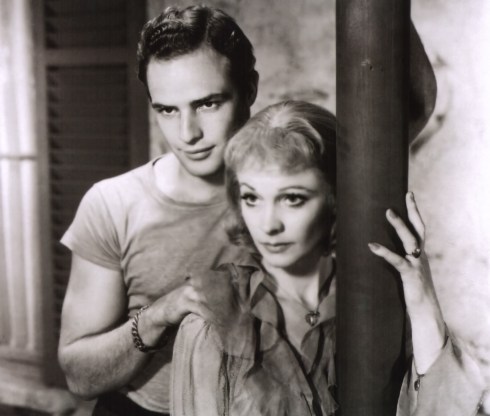

‘Individuality’ is a temporary illusion of an unfragmented self. Williams’s plays both demonstrate the futility of trying to attain, define, and control human desire. The outcome is a brutally destructive path to self-annihilation. It does not go unnoticed that it is ‘homosexual desire’ that becomes cannibalized in Williams’s Suddenly, Last Summer, and “Desire and the Black Masseur,” whose central characters pursue homosexual encounters.
If you look at some of his other works, for instance, A Streetcar Named Desire (1947), Orpheus Descending (1957), and Sweet Bird of Youth (1959), none of the characters who suffer consequences from their unrestrained desires result in the act of physical incorporation.
Homosexuality, or the transgressive acts depicted in Suddenly Last Summer, challenges society’s reign on personal desire. Catherine’s alleged promiscuity, her rape by an adulterous male. Violet comments on Sebastian’s mythic chastity, as well as Catherine’s social class. In William’s plays, off-screen, there have been punishments shrouded in mystery that allude to castration. But here, the subject of cannibalism is prominent and is essential to Williams’ allegory. The act of cannibalism can be seen as a trope for the social anxiety surrounding homosexuality. What it represents is that if men can consume each other in terms of desire, then it shall play out as the consumer, ultimately being consumed. Literally, in William’s selected works, the homosexual male’s body is destroyed, as punishment for transgressing against the social institution of hetero-normativity.
Suddenly, Last Summer, a portrait of physical mutilation with the incorporation of the poly-sexual body as a representation of transgression reflects the fragmentation of identity propelled by the ambiguous chronicles of Sebastian’s conflicting and contradictory desires. It would have been difficult to facilitate this symbolism on stage, so I have no issue with Joseph L Mankiewicz‘s literal and visually stylistic form of annihilation.
Williams’s polysexual content is most explicit in Desire and The Black Masseur, conveyed more practically in short story form, as the atmosphere of the 1940s and 1950s was quite repressive, and painting any literary representation in the theater would not have gone so well for an unresponsive audience. He decided to push the boundaries, bringing the story to life and off the page, when he released Suddenly, Last Summer off-Broadway in 1958.
SPECIAL NOTE:

In Part I, I raised the question as to whether there was a conflict between the two female stars of the film, ending in Hepburn spitting in Mankiewicz’s face. There are reports and critical accounts suggesting that director Joseph L. Mankiewicz treated Montgomery Clift poorly during the production of Suddenly, Last Summer. Some sources specifically claim that Mankiewicz exhibited homophobic behavior toward Clift, who was dealing with private struggles—including his sexuality, substance dependence, and the aftereffects of a car accident. Accounts from the set mention that other cast members, particularly Katharine Hepburn, were so disturbed by Mankiewicz’s treatment of Clift that Hepburn allegedly spat in the director’s face after filming wrapped.
However, while these behind-the-scenes stories recur in critical discussions and biographies, it’s worth noting that direct documentary evidence of explicit, intentional homophobia by Mankiewicz is debated. The film’s production was certainly fraught with tension, and Mankiewicz’s behavior toward Clift is generally described as harsh or unsympathetic, but whether this was motivated solely or primarily by homophobia is sometimes left to interpretation. What does seem clear is that Clift, a vulnerable and marginalized figure in Hollywood due to his sexuality and personal struggles, did not find a supportive environment under Mankiewicz’s direction on this film.
Understanding that it was difficult to shoot Montgomery Clift, who had become a serious drug and alcohol addict stemming from the near-fatal car crash that disfigured his face, it’s been written that he would try to find different ways to get his fix. “Though I could never fathom the source,” editor William Hornbeck says in Kenneth L. Geist’s bio of director Joseph L. Mankiewicz: People Will Talk, “Joe thought he was either smoking or taking dope or drinking by putting booze into his orange juice.”
The actress Katharine Hepburn did, however, have conflicts with him for other reasons. It has also been written that she had a problem with Mankiewicz’s apparent favoritism of Elizabeth Taylor and Hepburn wanting to have more control over the content and directing of the film.

Tennessee Williams consecrates the world of human frailty and desire, offering us stories that are relentlessly provocative, regenerative, and defiantly ambivalent. They haunt us, make us bellow and ache, force us to make contact with our own inner demons, and, ultimately, put us back into a world that is inescapable to inhabit.
Thank you for bearing up under the weight of this very intense and intensive post. The film is quite remarkable if you are just to approach it as theatrical entertainment, a collection of fine acting, directing, cinematography, and set design.
Be Happy, Be Yourself, and Be True-Eternally Yours, MonsterGirl



















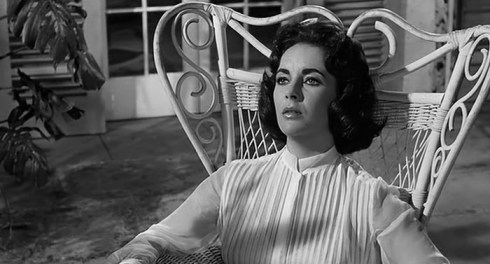

























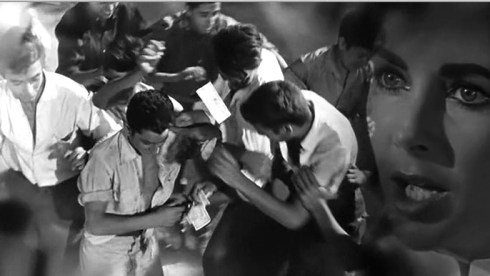


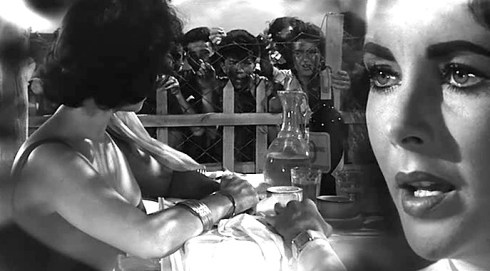










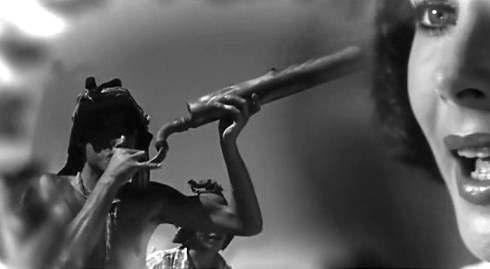






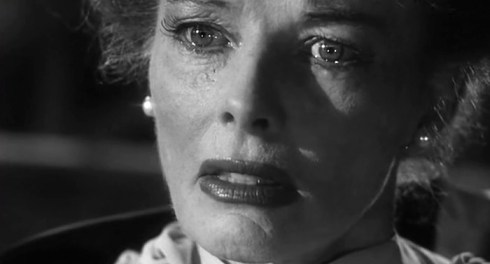





































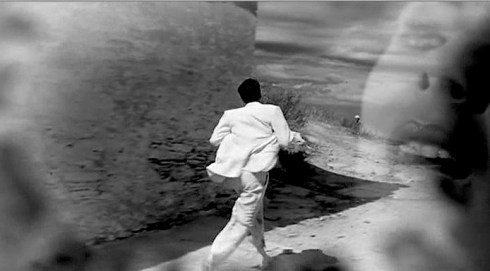

















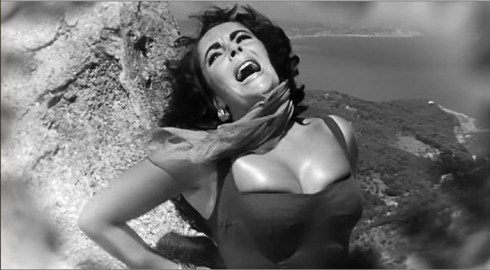

























Joey, you’ve done a magnificent job with your series about SUDDENLY, LAST SUMMER! While most readers might not necessarily consider a then-contemporary 1959 movie drama to be Gothic horror, I say it fits the bill perfectly, with all the secrets and Freudian elements. If Elizabeth Taylor’s Catherine Holly isn’t a damsel-in-distress (kinda like THE SNAKE PIT meets ROSEMARY’S BABY, I don’t know who is – and I mean that as a compliment! Tennessee Williams was a complicated man, to say the absolute least! BRAVA to an amazing serious, my friend!
Dori-thanks so much my friend for wading through the muck and the mire of my intensive ramblings once again. The film is such a hybrid of many genres, depending on which view you’re taking at the time. I believe it does fall into Grand Guignol Gothic horror, just for the sheer horror of it’s theme of wiping away a woman’s identity, and of course the notion of cannibalism, though William’s intended that to be allegorical, Mankiewicz took it to a disturbing visual level that is indeed horrific. I plan on watching The Snake Pit and Caged soon and doing a piece on films set in Mental Institutions. I think I’ve drafted it as It’s A Mad House. And yes, if Catherine Holly isn’t a women in peril, I don’t know who is either. Thank you for your kind words and praise yet again. You’re my pal and BRAVA on your AUNTIE MAME post once again. The mutual admiration society continues on-
Wow – this is almost as thorough as a dissertation! Excellent analysis of that crucial scene of the movie. I don’t think I’ve read a more comprehensive overview. Nice work!
That is such a compliment you know. I spent almost 8 years watching my partner jump through hoops of fire in Grad School eventually working on her dissertation. And it was no easy triumph, so I know what goes into that undertaking. It’s an ordeal. If my posts are even close to that, then I’m doing something right. Albeit, the people who might start falling asleep after word 540. As always thank you for showing me the love-Joey MG
I ate these blog posts up. Thank you for your work!